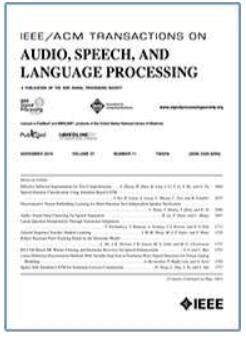盲音频带宽扩展:基于扩散的零镜头方法
IF 5.1
2区 计算机科学
Q1 ACOUSTICS
IEEE/ACM Transactions on Audio, Speech, and Language Processing
Pub Date : 2024-11-27
DOI:10.1109/TASLP.2024.3507566
引用次数: 0
摘要
音频带宽扩展涉及从带宽有限的观测中真实地重建高频频谱。在低通降级未知的情况下,例如在恢复历史音频记录时,这就变成了一个盲目的问题。本文介绍了一种名为BABE(盲音频带宽扩展)的新方法,该方法利用预训练无条件扩散模型的生成先验来解决零射击设置中的盲问题。在推理过程中,BABE使用了一种广义的扩散后验抽样,其中退化算子是未知的,但被参数化并迭代推断。使用客观和主观指标对所提出方法的性能进行了评估,结果表明,在使用合成数据进行测试时,与知情方法相比,BABE超越了最先进的盲带宽扩展基线,取得了具有竞争力的性能。此外,BABE在增强真实历史记录时表现出强大的泛化能力,有效地重建缺失的高频内容,同时保持与原始记录的一致性。主观偏好测试证实,BABE显著提高了历史音乐录音的音频质量。使用所建议的方法恢复的历史记录的示例可在配套网页上找到:http://research.spa.aalto.fi/publications/papers/ieee-taslp-babe/本文章由计算机程序翻译,如有差异,请以英文原文为准。
Blind Audio Bandwidth Extension: A Diffusion-Based Zero-Shot Approach
Audio bandwidth extension involves the realistic reconstruction of high-frequency spectra from bandlimited observations. In cases where the lowpass degradation is unknown, such as in restoring historical audio recordings, this becomes a blind problem. This paper introduces a novel method called BABE (Blind Audio Bandwidth Extension) that addresses the blind problem in a zero-shot setting, leveraging the generative priors of a pre-trained unconditional diffusion model. During the inference process, BABE utilizes a generalized version of diffusion posterior sampling, where the degradation operator is unknown but parametrized and inferred iteratively. The performance of the proposed method is evaluated using objective and subjective metrics, and the results show that BABE surpasses state-of-the-art blind bandwidth extension baselines and achieves competitive performance compared to informed methods when tested with synthetic data. Moreover, BABE exhibits robust generalization capabilities when enhancing real historical recordings, effectively reconstructing the missing high-frequency content while maintaining coherence with the original recording. Subjective preference tests confirm that BABE significantly improves the audio quality of historical music recordings. Examples of historical recordings restored with the proposed method are available on the companion webpage:
http://research.spa.aalto.fi/publications/papers/ieee-taslp-babe/
求助全文
通过发布文献求助,成功后即可免费获取论文全文。
去求助
来源期刊

IEEE/ACM Transactions on Audio, Speech, and Language Processing
ACOUSTICS-ENGINEERING, ELECTRICAL & ELECTRONIC
CiteScore
11.30
自引率
11.10%
发文量
217
期刊介绍:
The IEEE/ACM Transactions on Audio, Speech, and Language Processing covers audio, speech and language processing and the sciences that support them. In audio processing: transducers, room acoustics, active sound control, human audition, analysis/synthesis/coding of music, and consumer audio. In speech processing: areas such as speech analysis, synthesis, coding, speech and speaker recognition, speech production and perception, and speech enhancement. In language processing: speech and text analysis, understanding, generation, dialog management, translation, summarization, question answering and document indexing and retrieval, as well as general language modeling.
 求助内容:
求助内容: 应助结果提醒方式:
应助结果提醒方式:


